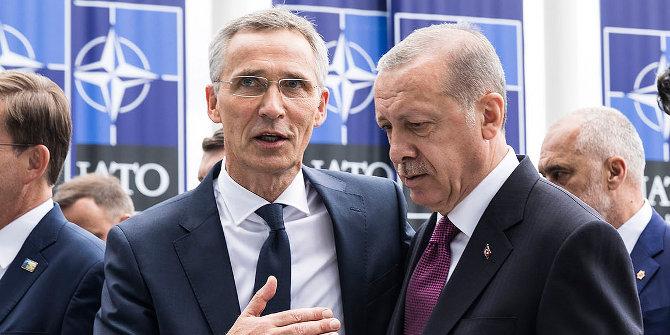 The value of the Turkish lira has hit record lows during 2018, with fears of the country slipping into an economic crisis. Didem Buhari-Gulmez explains that beyond the impact on Turkey’s economy, the crisis also has important geopolitical implications. The situation might deepen existing divisions between Turkey and the West, while encouraging the country to seek new allies among those states frustrated with western policy-making.
The value of the Turkish lira has hit record lows during 2018, with fears of the country slipping into an economic crisis. Didem Buhari-Gulmez explains that beyond the impact on Turkey’s economy, the crisis also has important geopolitical implications. The situation might deepen existing divisions between Turkey and the West, while encouraging the country to seek new allies among those states frustrated with western policy-making.
It may be claimed that the 2018 currency crisis in Turkey resembles the country’s 2001 banking crisis. Yet, the current crisis points to serious geopolitical implications because of certain key differences. The 2001 crisis took place at a time of political instability. There was a lack of authority caused by short-lived coalition governments throughout the 1990s. The 2018 crisis erupted in an era when the AKP single-party government and President Erdogan had already consolidated their rule due to a series of radical amendments in the political system and cadres that have been implemented since the mid-2000s. So, the 2018 crisis may be instrumentalised by the government to legitimise restrictive measures in the eyes of the Turkish public and may lead to increased suspicion against the West.
During the 2001 crisis, the political and bureaucratic circles – often recruited from among the holders of Western diplomas – were largely influenced by a strong Turkish military that led the National Security Council of Turkey and determined important policies in many sectors – such as education – that it considered a matter of security. The AKP changed recruitment policies and promoted people with an Islamic education background to join political and bureaucratic elites. In addition, after a series of trials against the military – such as the so-called Ergenekon and Balyoz trials – and the mass ousting of public servants following the coup attempt in July 2016, Turkish political and military institutions have never been so fragile. Meanwhile, multiple threats at Turkey’s southern borders – including IS and PKK-related terrorism – threaten Turkey’s national security.
Last but not least, Turkey’s pro-Western orientation that dates back to the founding years of the Turkish Republic in the 1920s has never been so contested. In 2001, Turkish political and economic elites were generally in favour of a continuation and deepening of relations with the US and the EU. Today, Turkey’s relations with the EU and the US are tense, if not conflictual. Not only are Turkey’s EU prospects increasingly uncertain, but its NATO membership that dates back to 1952 is also being questioned in both Turkey and the West, especially after the Turkish-Russian deal over S-400 missiles.

NATO Secretary General Jens Stoltenberg with Turkish President Recep Tayyip Erdogan, Credit: NATO (CC BY-NC-ND 2.0)
The 2001 economic crisis led to the rise of a new party – the AKP – which was seen as a ‘saviour’ by a Turkish public who viewed the lack of political stability as the main cause of the crisis. Turkey’s image and the trust it instilled in foreign investors was given a further boost when the AKP formed a single-party government and started to implement IMF and EU-led liberal reforms. Turkey’s foreign policy initiatives under the AKP – influenced by Ahmet Davutoğlu – reflected a new reformism that sought to reconcile Asia and Islam with the West by emphasising Turkey’s soft power in former Ottoman and Islamic territories. Yet, Turkey’s new elites faced serious problems both at home and abroad. The EU failed to sufficiently support Turkey’s membership bid and the Cyprus policy reform, while Turkey’s old establishment resisted the AKP’s reforms and the party’s so-called neo-Ottomanist/Islamist rhetoric, attempting to curb AKP power through political and legal channels.
The AKP’s efforts to consolidate its authority by amending the Constitution and the political system raised suspicions about whether Turkey was distancing itself from the Western model of liberal democracy. In particular, the 2013 anti-government protests and the state of emergency following the putsch attempt in July 2016 increased anti-Western rhetoric among Turkish political elites, who accused European and American governments of supporting anti-government groups such as Gezi protesters and Gulenists. Turkey’s rapprochement with Russia – despite Turkey shooting down a Russian jet in 2015 and the assassination of the Russian ambassador in Turkey in 2016 – coincided with rising tensions between Turkey and the US over Fethullah Gulen’s extradition, the release of American pastor Andrew Brunson, and a US legal case concerning the violation of Iranian sanctions by Turkey. Turkish elites have sought to find an alternative to Turkey’s traditional Western alliance in order to enjoy greater freedom of manoeuvre in the face of multiple security threats and Turkey’s energy dependence on Russia and Iran.
Furthermore, certain exogenous developments such as the economic crisis, Brexit and the Syrian refugee crisis have deprived Turkey of a reliable source of funds, prompting the country to seek new allies in the Islamic world. As the value of the Turkish lira has plummeted, Turkish elites have openly blamed Western speculators for the country’s economic and political crises. Since 2008, the discourse used by Turkish elites has become more and more antagonistic toward the West, with the latter often depicted as being ruled by Islamophobic and anti-Turkish elites who wish to curb Turkey’s economic growth and political clout in its neighbourhood. The supporters of Davutoğlu’s vision are now seen as too close to the West and they have lost influence over the new Turkish foreign policy.
The economic crisis seems to have deepened the rift between Turkey and the West. Turkey’s search for new allies – including in South East Asia, the Balkans, the Gulf region and Africa – focuses on cultural-religious affinity based on the Ottoman legacy and Islam, as well as a common experience of frustration with the Western-dominated world system.
Please read our comments policy before commenting.
Note: This article gives the views of the author, not the position of EUROPP – European Politics and Policy or the London School of Economics.
_________________________________
 Didem Buhari-Gulmez
Didem Buhari-Gulmez
Didem Buhari-Gulmez is a former Visiting Fellow at LSEE Research on South Eastern Europe, LSE European Institute, and is currently an Associate Professor of International Relations.



